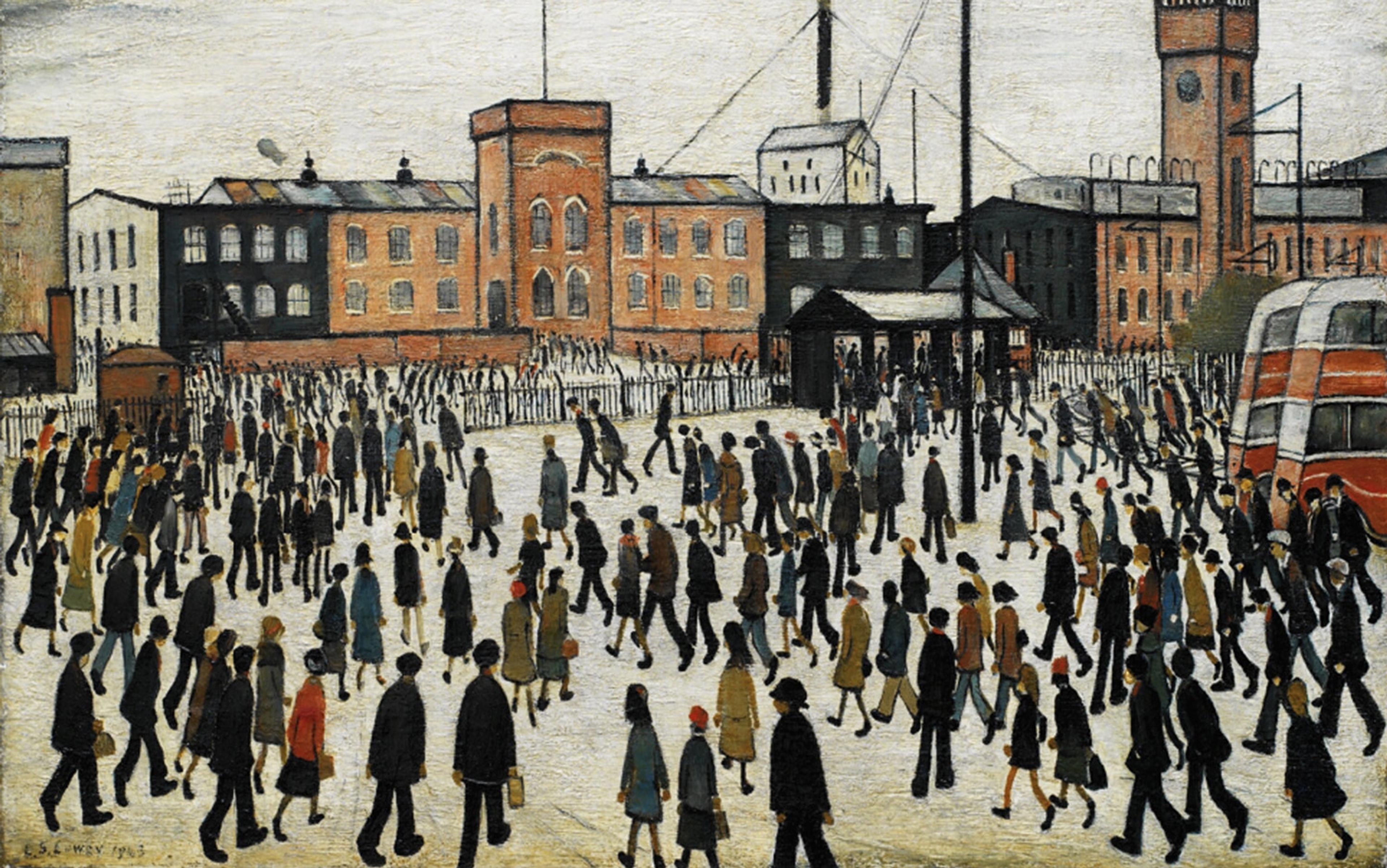In the early 1990s, career advice in the United States changed. A new social philosophy, neoliberalism, was transforming society, including the nature of employment, and career counsellors and business writers had to respond. The Soviet Union had recently collapsed, and much as communist thinkers had tried to apply Marxist ideas to every aspect of life, triumphant US economic intellectuals raced to implement the ultra-individualist ideals of Friedrich Hayek, Milton Friedman and other members of the Mont Pelerin Society, far and wide. In doing so for work, they developed a metaphor – that every person should think of herself as a business, the CEO of Me, Inc. The metaphor took off, and has had profound implications for how workplaces are run, how people understand their jobs, and how they plan careers, which increasingly revolve around quitting.
Hayek (1899-1992) was an influential Austrian economist who operated from the core conviction that markets provided the best means to order the world. Today, many people share this conviction, and that is in part because of the influence of Hayek and his cohort. At the time that Hayek and his circle began making their arguments, it was an eccentric and minority position. For Hayek and the Mount Pelerin group, the centralised economic planning that characterised both communism and fascism was a recipe for disaster. Hayek held that humans are too flawed to successfully undertake the planning of a complex modern economy. A single human being, or even group of human beings, could never competently handle the informational complexities of modern economic systems. Given humans’ limitations in the face of modern economic complexity, freeing the market to organise large-scale production and distribution was the best possible course.
Hayek understood that markets do not emerge naturally, that traders, consumers and laws construct markets. Once established, markets have tendencies towards monopoly and other business practices that could undercut forming an even playing field. So markets can’t be entirely left to self-regulate; laws and governments are necessary. Indeed, this is the primary reason why governments should exist – to ensure that markets function well. Governments should not be providing services to its citizenry such as public transportation or a postal service – Hayek believed that private interests most efficiently manage these services. Also governments should not be providing forms of welfare to its citizens, since welfare undercuts how the market allocates value and introduces too much centralised planning. Instead, what governments should focus upon is organising markets well, keeping them functioning to promote competition, and thus also promoting innovation. Because market competition is the goal, arbitrarily curtailing this competition through tariffs or other nationalist strategies for undercutting a global market was also deeply undesirable. Hayek wanted a global market.
This approach to markets and governments, commonly called neoliberalism by its critics, has grown increasingly dominant. As this theory moved off the page and the blackboard, people who wanted to live according to neoliberal principles ran into a basic problem. This is a specific way of dealing with markets, even for those committed in principle to capitalism. So, as more governments and businesses adopted market measures as often as possible, new ways of talking about many aspects of life, including work and careers, arose. Every total way of life, after all, requires its own vocabulary.
Predictably, saying that ‘the market is the best way to organise or determine value’ overlooks many sorts of life dilemmas. Hayek did understand that his model of making the market so foundational would require a specific kind of person, a new kind of person. But he never developed an effective model for making complicated decisions such as deciding whom to hire for a job opening, or how to fashion a career over a lifetime. Others, the Nobel Prize-winner Gary Becker for example, who coined the idea of human capital, had to come up with concrete models for how people should, in market terms, understand everyday interactions. Inspired by Becker in adopting the market idiom, business writers began to talk about how people need to think about investing in themselves, and viewing themselves as an asset whose value only the market could effectively determine. Over time, a whole body of literature emerged advocating that people should view themselves as a business – a bundle of skills, assets, qualities, experiences and relationships to be managed and continually enhanced.
The change that saw business writers, career counsellors and others adopting the view that individual employees, or potential employees, should think of themselves as businesses occurred at the same time that the way the value of a company was assessed also changed. Not so long ago, business people thought that companies provided a wide variety of benefits to a large number of constituents – to upper management, to employees, to the local community, as well as to shareholders. Many of these benefits were long-term.
But as market value overtook other measures of a company’s value, maximising the short-term interests of shareholders began to override other concerns, other relationships. Quarterly earnings reports and stock prices became even more important, the sole measures of success. How companies treated employees changed, and has not changed back. A recent illustration of the ethos came when American Airlines, having decided that its current levels of compensation were not competitive, announced an increase to its staff salaries. The company was, in fact, funnelling money to workers instead of to its shareholders. Wall Street’s reaction was immediate: American Airlines’ stock price plummeted.
In general, to keep stock prices high, companies not only have to pay their employees as little as possible, they must also have as temporary a workforce as their particular business can allow. The more expendable the workforce, the easier it is to expand and contract in response to short-term demands. These are market and shareholder metrics. Their dominance diminished commitment to employees, and all other commitments but to shareholders, as much as the particular industry requirements of production allow. With companies so organised, the idea of loyalty receded.
Companies now needed to free themselves as much as possible of long-term obligations, such as pensions and other worker incentives. Employees who work long, and in many cases, intense hours to finish short-term projects, became more valuable. While companies rarely say so explicitly, in practice they often want employees who can be let go easily and with little fuss, employees who do not expect long-term commitments from their employer. But, like employment, loyalty is a two-way street – making jobs short-term, commitment-free enterprises leads to workers who view temporary work contracts as also desirable. You start hiring job-quitters.
Good jobs were ones with a good salary, benefits, etc. Now, it’s one that prepares you for your next job
The CEO of Me, Inc is a job-quitter for a good reason – the business world has come to agree with Hayek that market value is the best measure of value. As a consequence, a career means a string of jobs at different companies. So workers respond in kind, thinking about how to shape their career in a world where you can expect so little from employers. In a society where market rules rule, the only way for an employee to know her value is to look for another job and, if she finds one, usually to quit.
If you are a white-collar worker, it is simply rational to view yourself first and foremost as a job quitter – someone who takes a job for a certain amount of time when the best outcome is that you quit for another job (and the worst is that you get laid off). So how does work change when everyone is trying to become a quitter? First of all, in the society of perpetual job searches, different criteria make a job good or not. Good jobs used to be ones with a good salary, benefits, location, hours, boss, co-workers, and a clear path towards promotion. Now, a good job is one that prepares you for your next job, almost always with another company.
Your job might be a space to learn skills that you can use in the future. Or, it might be a job with a company that has a good-enough reputation that other companies are keen to hire away its employees. On the other hand, it isn’t as good a job if everything you learn there is too specific to that company, if you aren’t learning easily transferrable skills. It isn’t a good job if it enmeshes you in local regulatory schemes and keeps you tied to a particular location. And it isn’t a good job if you have to work such long hours that you never have time to look for the next job. In short, a job becomes a good job if it will lead to another job, likely with another company or organisation. You start choosing a job for how good it will be for you to quit it.
In significant ways, the calculus of quitting changes workplace dynamics. Being a good manager now means helping those whom you manage acquire the skills that will help them to leave for a better job at another company. Good managers know this. I observed a Berkeley continuing education workshop for new managers, and one speaker described her strategies for behaving well to her team. She explained that she did this from the outset by clarifying what she understood their implicit business contract to be. She takes each new member of her team out to lunch in the week they start: ‘So I always say things like: “You don’t work for me, I work for you… My job is to make sure you can do your job well. And one day, you are going to leave this job, right, our careers are long, and we will have many jobs along the way. When you want to leave this job, I hope to be here to help you move on to this next job.”’ From the outset, managers say that they will help those who work under them become job-quitters – to find the next best stepping stone in their career.
The calculus of quitting also changes what it means to have a good division of labour at work. If your goal is to get a job somewhere else, not all work projects are equally valuable. Workers must jockey for the tasks and projects that might lead to a job elsewhere. They must try to avoid tasks that, either due to intellectual property issues or for other reasons, are too company-specific. Linus Huang, a sociologist at Berkeley, saw this happening in the Silicon Valley startup where he was working when Java was first becoming a popular programming language. There was quite a bit of work in his company involving the general-purpose programming language, C++ , and for many of the company’s needs, it was sufficient. Employees wanted to have practice with Java, however, because Java would make them more marketable in the future. Workers began to evaluate projects in terms of whether they would improve their Java skills. The managers began to struggle to find people who would do the day-to-day programming work, mostly in C++, upon which the company depended. They had no trouble, on the other hand, finding people to work on the few Java projects. When you work a job that presumes you will quit before too long, the tasks that are good for the company might not be good for you.
The calculus of quitting also changes the nature of being co-workers, and not just because they are jockeying over who does which tasks in a new way. While you might always have wanted to get along with your co-workers, the quitting economy introduced a new instrumental reason why collegiality is especially important. Now that people aren’t supposed to stay all that long at a company, you experience a regular turnover in your workplace. Workers who used to get ahead by impressing their managers by being steady, self-effacing and conscientious no longer have the time to establish the appreciative audience they used to within a company. As a result, these types of workers might no longer be steadily promoted. If their co-workers appreciate them, however, then they might, when it comes time for them to look for their next job, have supporters at other companies. After all, everyone works in the quitting economy, and everyone knows it, creating a different incentive for people to get along with their co-workers. Today, when every job opening has too many applicants, having an insider in the company who can be an ally can make all the difference.
One recruiter told executives that, if they didn’t feel passion for their work, then they were harming all their colleagues
The environment of the quitting economy also brings about a change in the emotional life of the worker and workplace. When you start imagining yourself as always on the verge of quitting, the emotions you feel for your work change. When companies decided to do away with company loyalty, businesses had to find a new way to help workers foster an emotional connection to work. In the US especially, there is a strong cultural consensus that people should feel passion for their work, and work hard. One hiring manager explained to me that he always chose people who seemed passionate about their work over someone who seemed to have the most experience. He could teach them any necessary skills, he explained, but his need for them to work very long hours meant that he needed people with passion. Since company loyalty is no longer around to guarantee committed workers, passion is now supposed to be the driving force.
Intriguingly, this passion that workers are supposed to feel is restricted to the tasks at work or to learning certain skills. People are not supposed to feel passion for working with particular people. Nor do workers talk about having passion for augmenting the reputation of the company for which they work. Passion is reserved for the tasks that they do or learn to do, for the solutions that they might develop for the company’s market-specific problems. Not surprisingly, the market-specific problems for which workers feel a passion for solving are usually the problems that a range of companies might face. They aren’t specific to that particular company. In the quitting economy, you have to work for passion, and working for passion means focusing on the task, not the company.
Cultivating their feelings of passion for tasks that bring market remuneration makes workers more mobile. It is easier for them to consider moving to another company where they can still do the work about which they feel passionately. One executive recruiter told me she used this focus on passion to help convince executives to leave, regardless of the financial incentives put in place by their current company. She would tell an executive she was trying to recruit that if they no longer felt any passion for their work, then they were harming all their colleagues at work, who now had to work with someone who no longer enjoyed work to its utmost. In short, when one of the main reasons to work somewhere is because you feel passion, when you stop feeling that passion, it is easier to quit.
In a way new to the world, and begun by the re-orientation of companies to maximise shareholder value, quitting work is now central to what it means to have a job in the first place. People apply for jobs with the conscious plan to quit, with an eye toward what other jobs the job for which they are applying might help them get. Managers welcome new employees by promising to position them as advantageously as possible to quit in a few years. Co-workers, the ones who like you, are now hoping you will quit – since if you do, you might help them get a good job somewhere else. As is often the case, history brings unintended consequences, even to doctrinaire and theoretical ideas. Hayek’s philosophy has led to workers thinking of themselves as the CEO of Me, Inc; and to survive in the neoliberal world of work, the CEO of Me, Inc must be a quitter.






